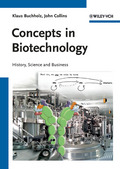Concepts in Biotechnology
History, Science and Business

1. Edition December 2010
XXVI, 472 Pages, Softcover
129 Pictures (18 Colored Figures)
24 tables
Textbook
Short Description
A book like no other existing textbook. Looking behind the curtains, it provides a thorough analysis of the foundations of the present day biotech industry for students and professionals alike: its history, its tools and processes, its markets and products.
Buy now
Price: 59,90 €
Price incl. VAT, excl. Shipping
Euro prices for Wiley-VCH and Ernst & Sohn titles are only valid for Germany. In EU countries, local VAT applies. Postage will be charged.
- Out of print -
Adopting a unique approach, this novel textbook integrates science and business for an inside view on the biotech industry. Peering behind the scenes, it provides a thorough analysis of the foundations of the present day industry for students and professionals alike: its history, its tools and processes, its markets and products. The authors, themselves close witnesses of the emergence of modern biotechnology from its very beginnings in the 1980s, clearly separate facts from fiction, looking behind the exaggerated claims made by start-up companies trying to attract investors. Essential reading for every student and junior researcher looking for a career in the biotech sector.
PART ONE: History
INTRODUCTION
THE EARLY PERIOD TO 1850
Introduction
Experimental Scientific Findings
Application
Theoretical Approaches
THE PERIOD FROM 1850 TO 1890
Introduction
Experimental Findings
Practical Application, Technical Progress and Institutional Development
Theoretical Approaches
THE PERIOD FROM 1890 TO 1950
Introduction
Research - Advances in the Basics of Biotechnology: Experimental Findings
Technological Development, Progress and Application
Theoretical Approaches
OUTLOOK, FROM 1950 ONWARDS: BIOTECHNOLOGY - SCIENCE OR WHAT?
Introduction
Traditional Biotechnology and the Dechema Report
The Changing Focus in BT in the USA in the Early 1980s
Conclusions
PART TWO: The New Paradigm Based on Molecular Biology and Genetics
BROADENING OF BIOTECHNOLOGY THROUGH UNDERSTANDING LIFE, GENETICS AND EVOLUTION
THE BEGINNINGS OF THE NEW BIOTECHNOLOGY
Introduction
The Beginnings of Evolution Theory and Genetics
The Origin of Recombinant DNA Technology
Oligonucleotide Synthesis Leads to Protein Engineering
Synthetic DNA, Reverse Transcriptase: Isolating Genes
Biodiversity and Gene Mining
Creating New Diversity by Design or Empirically
'Genetic Fingerprinting'
Inherited Predisposition to Disease
ETHICAL ASPECTS RELATED TO GENOME RESEARCH, AND REPRODUCTIVE MEDICINE
Negative Public Reaction to Gene Technology
Ethical Aspects: Animal Cloning and Fertility Research
ELUCIDATING PROTEIN STRUCTURE: THE BEGINNINGS OF RATIONAL PROTEIN DESIGN
Cambridge England, the Cradle of Structural Analysis of Macromolecules
Redesigning the Protein Core
Redesigning the Protein by Altering Primary Sequence
Post Translational Modifications
Total Chemical Synthesis
Validation of Drug Design Based on the known Structure of the Target
General Considerations in Drug Development
THE DEVELOPMENT OF ANTIBODIES AS PHARMACEUTICAL PRODUCTS
An Introduction to the Immune System
The Beginnings of Applied Immunology
Monoclonal Antibodies
Producing Antibodies via rDNA and Combinatorial Biology
Affinity Enrichment on Surfaces of Immobilized Target Molecules
Mice with Human Antibody Gene Repertoires
Two Severe Setbacks during Clinical Testing
A Survey of Therapeutic Antibodies
HEREDITARY DISEASE AND HUMAN GENOME ANALYSIS
Introduction
Heredity Studies and Family Counselling
Early Attempts to Analyse the Human Genome
The Personalized Genome and Personal Medicine
Analysing the Effect of the Environment on the Human Genome: Epigenetics
TRANSGENIC ANIMALS AND PLANTS
Introduction
Stem Cells and Gene Targeting
EXTRAPOLATING TO THE FUTURE
Summary of the Status Quo
Insect Control Through 'Sterile' Males (SIT)
The Future of Gene Therapy
Stem Cell Therapy
Flash Sequencing DNA: A Human Genome Sequence in Minutes?
Systems Biology and Looking for 'Druggable' Targets
Synthetic Biology
BIOTECHNOLOGY AND INTELLECTUAL PROPERTY
Introduction
Patents Ensure Growth and Rapid Dissemination of Knowledge
Owning a Patent does not simply Mean that it can be Implemented: 'Freedom to Operate' (FTO)
Life-Forms as 'Novel Subject Matter' for Patents?
Technology 'State of the Art': Precedence/Directives, not Fixed by Law
Who can make Decisions about Public Morality?
Biotechnology-Oriented Directives Guide Patenting Decisions
PART THREE: Applications
BIOPROCESS ENGINEERING
Introduction
Aspects of Applied Microbiology
Biocatalysis
Biochemical Engineering
Process Sustainability and Ecological Considerations
Biosystems Engineering, Including Omics Technologies
Outlook and Perspectives
INDUSTRIAL BIOTECHNOLOGY
Introduction
General Aspects
Commodities
Chemicals
Food Processing and Products
Environmental Processes
Summary, Trends and Perspectives
PHARMACEUTICAL BIOTECHNOLOGY
Introduction
Drug Targeting, Discovery Strategies and Development
Pharmaceuticals Production
Products, Pharmaceuticals Made by Biotechnology
Medicinal Techniques, Diagnostics
Business: Companies and Economic Aspects
PLANT BIOTECHNOLOGY
Introduction
Political, Ethical and Biosafety Aspects
Research and Development
Application of Modified Plants and Products
Economic Aspects
Summary and Outlook
well-known textbook on biocatalysts and an advisory board member of several journals.
Born in 1945, John Collins studied Microbiology (B.Sc.) at University College, London University, and a doctorate (Ph.D.; 1971) at the University of Leicester, UK. Postdoctoral work was carried out at UCSD, La Jolla 1971-4 with Don Helinski at the time DNA cloning was developed in collaboration with the Cohen and Boyer labs.
He brought this technology to the University of Copenhagen, developing gene cloning methods to isolate and study bacterial and eukaryotic genes and how they are regulated. In 1975 he joined the German National Center for Biotechnological Research (GBF; now HZI) in Braunschweig initiating some of the first experiments to apply gene technology to biotechnological projects (Penicillin acylase, interferon ß; Cytomegalovirus; mutein design of protease inhibitors). In 1987 he accepted a joint appointment as section Head for Cell Biology and Genetics at the GBF and as Professor at the Technical University of Braunschweig. He has worked as international adviser to a number of governments and institutes and lectures on biotechnology, intellectual property, genetics and evolution. He is an elected EMBO (European Molecular Biology Organisation) member and was a founding member of the Human Genome Organistion (HUGO). In 1997 he founded a Biotech Company which was acquired by a Californian Company in 2002. His current work is directed at the development of Inhibitors
of Hepatitis C virus using combinatorial biology as well as trying to explain the impact of scientific developments to the informed public.


